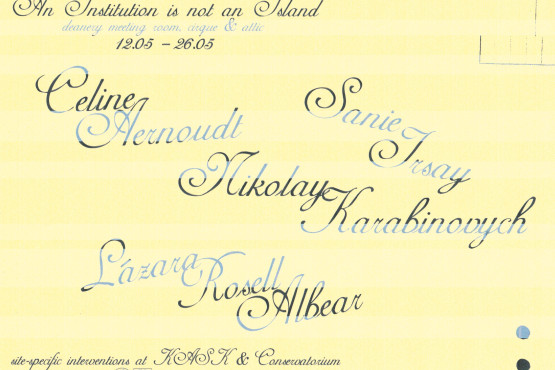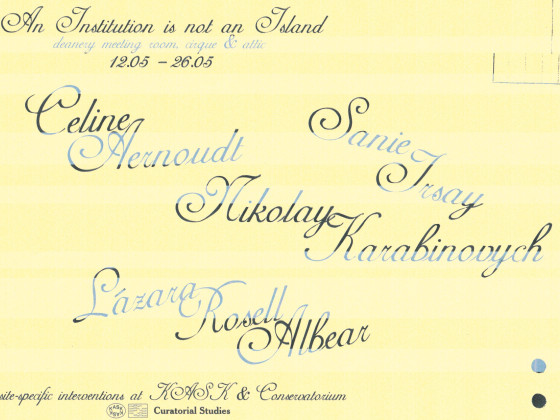
Opening: An Institution is not an Island
KASK & Conservatorium Gent
12–26.05.2025
KASK & Conservatorium
An Institution is not an Island originated from an encounter with a deanery meeting room at KASK & Conservatorium. This room is often referred to as the ‘Malfait’ room, located on the first floor of the Pauli building. As part of a personal project by one of the previous deans, the room is filled with portraits and busts depicting central figures of KASK & Conservatorium’s history. With a portrait of former director Chantal de Smet by Anne-Mie van Kerckhove as the only exception, all portraits are of men.
Chantal de Smet wrote in a reflection on a decade of KIOSK that “an institution is not an island”, emphasising the importance for art students to be confronted with society and the broader responsibilities of art institutions – responsibilities that are always shaped by historical contexts. Which histories of KASK & Conservatorium are made visible within its current infrastructure, and which narratives are hidden, forgotten, or erased? How do we engage with and position ourselves in the layered histories and spatial politics of the school and the Bijloke site? If we consider the institution as soft power and space as hard power, in what ways might we be able to reclaim and engage with both on our own terms?
In The Production of Space (1974), Henri Lefebvre argues that space is never neutral. Spaces are designed, occupied and controlled, often favoring dominant ideologies. An Institution is not an Island has invited artists to intervene in KASK & Conservatorium’s spaces, much like how Lefebvre suggests urban space should be claimed by those who inhabit it. It offers an opportunity to question institutional, infrastructural, historical and spatial hierarchies and collectively reflect on spaces as sites of resistance and transformation.
Over the course of two weeks, four artistic interventions will unfold in the deanery meeting room, the attic and the Cirque auditorium, each one adding, removing, and disrupting elements of the space. The project begins on May 12th with Sanie Irsay's displacement of the meeting room table to the attic. On May 15th, Nikolay Karabinovych will intervene by placing collage works in dialogue with the already-present portraits on the meeting room walls. On May 20th, Celine Aernoudt will install a carpet and a binder containing administrative documents on the floor of the room. An Institution is not an Island will conclude on the evening of May 26th with a public moment to encounter all three interventions within the meeting room (from 17:00), followed by a performance by Lázara Rosell Albear in the Cirque auditorium (at 19:00) — offering a new perspective on institutional space and presence.
We aim to (re)activate these different spaces, either existing in the margins or occupying the center of the institution, in ways that are reflective of and critical toward their history, current use, and imagined future. As bell hooks writes in Choosing the Margins as a Space of Radical Openness (1989): “Spaces can be real and imagined. The imagined ones are often the most powerful.”
Sanie Irsay
Deanery meeting room & attic
What is necessary to change so that everything stays the same? proposes to displace the meeting room table from the deanery meeting room to the attic of KASK & Conservatorium. The deanery meeting room is an active site where decisions are made that bear directly on the functioning and future of the institution, yet typically inaccessible to those outside formal structures. The attic of KASK & Conservatorium, conversely, is a dormant, guarded space, holding no daily rhythm. In removing this central table — in its bland light wood laminate, the symbolic and functional core of institutional operations — the room continues to serve as a meeting space but in a way that is awkwardly unfamiliar. The intent of What is necessary to change so that everything stays the same? is not to halt institutional processes but rather to unsettle the spatial and structural foundations that support them. It proposes the academic contemporary art institution as no longer a rigid, bureaucratic monolith, but increasingly fluid – “agile” – in response to shifting political and economic currents. The meeting room table will remain in the attic throughout the intervention, held in a state of suspended activity. These two spaces, each defined by different forms of inaccessibility, are made to speak to each other through their relationship to absence and presence, formality and informality.
Sanie Irsay (°1996) is a Crimean Tatar artist based between New York, NY and Arnhem, NL. Working across mediums like sculpture, drawing, print and film, she is centrally concerned with social and spatial structures, zones of inclusion, exclusion and exception. Her work has been shown in 2Walls (Amsterdam, NL), Het Paviljoen (Ghent, BE), Tunnel Gallery (Miami, FL), Allbright-Knox Art Gallery (New York, US), and the Mona Bismarck Center (Paris, FR), among others. She is currently a participant in Werkplaats Typografie.
Nikolay Karabinovych
Deanery meeting room
Atlas of Depths uses language as both an institutional tool and a means of resistance. This intervention traces linguistic displacements and acts of reclamation, offering a visual counterpoint to dominant narratives. How does language shape institutional memory? And can these spaces be reclaimed through alternative linguistic structures? Karabinovych's collages juxtapose found images, themselves "exiled"; forgotten, existing in oblivion, and often moving between Russian and other tongues. This tactile process involves cutting, moistening, and reconstructing paper and images in ways that preserve their historical dust while creating new meanings – a methodology. The collages function like "words in a rearranged sentence," pushing against the traditional narrative embodied by the portraits in the meeting room, while opening space for reimagining institutional history. Karabinovych’s work questions not only which specific historical figures are commemorated, but also how institutional memory itself is constructed, maintained, and potentially redefined.
Nikolay Karabinovych (°1988) was born in Odessa, Ukraine. He works across various media such as video installation, performance, sound, and sculpture. In his artistic practice, Karabinovych addresses complex social (hi)stories, particularly those from the expanses of "Eastern Europe",
combining them with personal family narratives. In 2020, Karabinovych graduated from the Higher Institute for Fine Arts (HISK) in Ghent. He was an assistant curator of the 5th Odessa Biennale (UA), and was awarded the first PinchukArtCentre Prize. His work has been shown at M HKA (Antwerp, BE), Museum de Fundatie (Zwolle, NL), MAXXI (Rome, IT), Centre for Fine Arts Bozar (Brussels, BE), w139 (Amsterdam, NL), Zamek Ujazdowski (Warsaw, PL), Kaunas Biennale (LT), Venice Biennale (IT), among others.
Celine Aernoudt
Deanery meeting room
Good Terms Bad Conditions is a work originally produced during Aernoudt’s residency at Air Berlin Alexanderplatz. In this site-specific iteration of the work, a binder peeks out from under a wall-to-wall carpet. The binder represents Aernoudt’s attempts to gather recently filed complaints of discrimination within and against KASK & Conservatorium. While the intention was to collect official administrative documents, what the binder ultimately holds is the process of collecting itself: a fragmented record marked by institutional opacity and bureaucracy. With this gesture, they aim not only for the work to dialogue with the existing portraits of the previous directors, but also with the current KASK & Conservatorium administrative board. Good Terms Bad Conditions acts like a missing cobble stone or a step that’s a little higher — quietly present, yet partially concealed. Something ‘swept under the rug’, something to accidentally stumble over, a hiccup that reminds us that the past is still eating us, even as we are tasked with shaping a more just future..
Celine Aernoudt (°1995) is based in Brussels, Belgium. They have a versatile body of work, including installations, performances, video, sculpture and text, in which they refer to self-consuming and self-erasing in relation to representational systems of today’s society: who and how are ‘we’ today? Drawing from personal iconography and popular culture, they jump between the position of the individual and the universal subject. They examine social space and its relationship to material vernaculars through the repositioning of familiar and standardised forms into installation and sculpture. They have participated in exhibitions at Art au Centre (Liège, BE), Uqbar (Berlin, DE), Kunstmuseum Olten (CH), Stadtgalerie (Bern, CH), White Garage (Catania, IT), n0dine (Brussels, BE), Kunsthal Ghent (BE), among several others.
Lázara Rosell Albear
Cirque Auditorium
Unsurrounded started as a solo performance project where sound, movement, visuals and words intercollide. Each iteration is different, finding inspiration in archival material and through re-using documentation of previous performances. These field recordings have developed into a collection of two decades of sonic archives. The work is an endless mutable container of transgressive colliding, non-linear thoughts, glitches, errors, and reverberations – a continuous work in progress. Over time, it has evolved into an interactive multimedia performance with active audience participation. Unsurrounded has previously been performed at WIELS, BRASS, Cinema Nova, Le Lac, and Filmhuis Mechelen, among others. Twenty years later, Lázara returns to KASK & Conservatorium to perform at Cirque, reflecting on her experience of being the only black student in class during her time at the art institution, as well as her background as a medical
student in Cuba. Through her performance, Lázara will perform a ‘dissection’ of the academy, reflective of her personal history and the history of the auditorium where it will take place.
Lázara Rosell Albear (°1971) is a Belgian-Cuban artist born in La Habana, Cuba. She is a KASK & Conservatorium graduate, having received her Master in Audiovisual Arts in the year 2000. Her practice combines a multiplicity of media, including sound research, performance, film, drawing and installation. Transgression, presence, resonance, vibrations, new worlds, poetry are the keywords of her unifying practice. Following her graduation from KASK & Conservatorium, Lázara co-founded the organization MahaWorks in 2001 together with composer, guitar player and digital media artist Eli Van De Vondel. Her work has been shown at Tate Modern (London, UK), III Bienal Bucaramanga (CO), Shortheater Rome (IT), Videonale Bonn (DE) and Kunsthaus Dresden (DE), to name a few. Her works are included in collections such as the Argos audiovisual arts centre (Brussels, BE), the Frans Masereel Centrum (Kasterlee, BE), Mu.ZEE (Ostend, BE) and the Kanal-Centre Pompidou (Brussels, BE).
An Institution is Not an Island Curation Flora Vanclooster, Bethan Burnside, Miranda Pastor, Maartje Claes, Tuta Chkheidze, and Hanna Julia Erdosi.
Graphic Design Minne Piot Kunstenbibliotheek Sylvia Czachorowska Suzy Castermans
Special thanks to Liene Aerts, Laura Herman, Isabel Van Bos, Sara Plantefève-Castryck, Joke Vangheluwe, Thomas Peeters & Filip Rathé
With the support of Curatorial Studies KASK & Conservatorium – Closing Event 26th May 2025 Malfait Room (from 17:00) Cirque (19:00) Free of charge More information curatorialstudies.be @not_anisland
